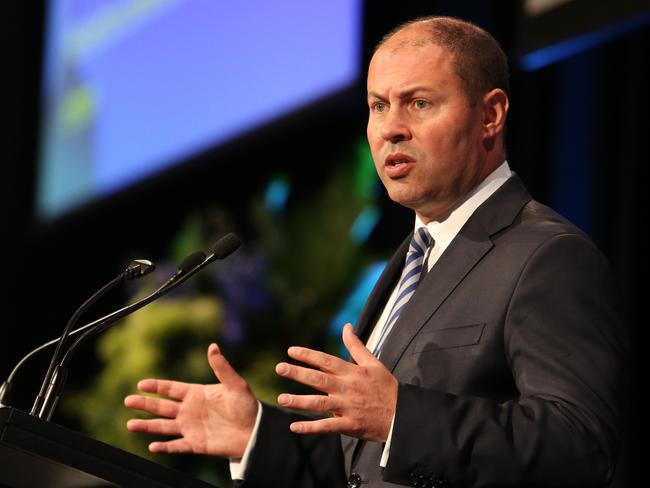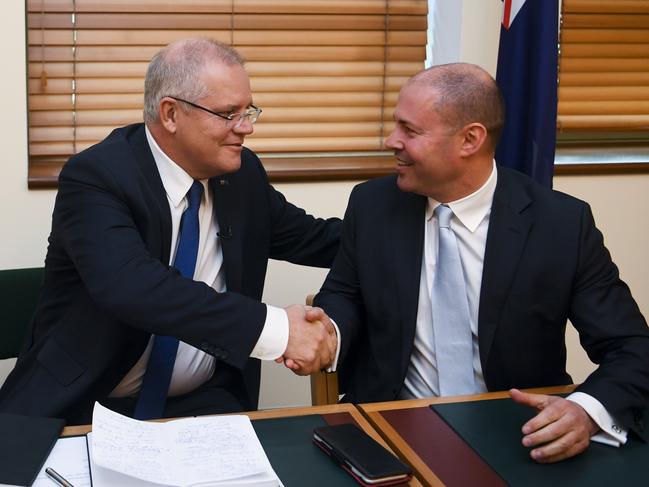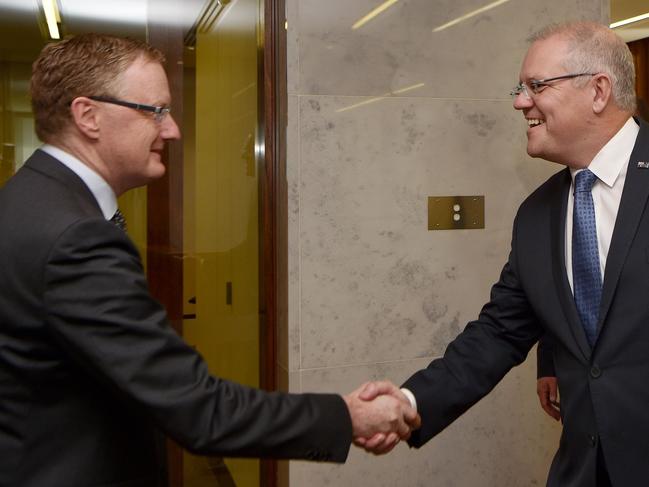Treasurer Josh Frydenberg pressures banks to pass on full rate cut
It’s D-Day for Australia’s first official rate cut in three years, Treasurer Josh Frydenberg has warned the banks, as we reveal nine ways the economy is bouncing back to help consumers.
Budgeting
Don't miss out on the headlines from Budgeting. Followed categories will be added to My News.
Exclusive: The Treasurer has put the big banks on notice to pass on in full Tuesday’s anticipated rate cut by the Reserve Bank of Australia.
With the RBA almost certain to lower its official cash rate from 1.5 per cent to 1.25 per cent, Treasurer Josh Frydenberg believes the banks should pass on “the benefits of sustained reductions in funding costs”.
And economists and finance specialists say it will be dangerous for them not to do this so soon after the damning banking royal commission.

A rate cut, combined with another likely cut within months and recent regulator moves to help with mortgage serviceability, will dramatically boost households’ borrowing power, new figures show.
Research group Canstar has found an average wage earner would be able to borrow an extra $32,000 — up from $363,000 to $395,000 — if the changes go through as expected.
The last time the Reserve Bank cut the official interest rate was in August 2016, and Canstar group executive of financial services Steve Mickenbecker said major banks only passed on 0.1 per cent instead of that 0.25 per cent cut.
How to stop bank fees from biting
Get rich for retirement with these super hacks
The biggest fears of landlords and tenants

This time it’s different, because the cost of funding home loans has dropped significantly since banks hit borrowers with out-of-cycle rate rises last year. The RBA started lowering the cash rate in 2011, and banks have pocketed more than 1 per cent of the 3.25 per cent of official cuts.
“There’s too much pressure not to pass on the whole lot,” Mr Mickenbecker said. “Those funding costs have come right down this year.”
He said nobody had the power to force banks to match the RBA but they wouldn’t want to face “the wrath of everyone including a newly fired-up Prime Minister”.
“The government’s got a whipping hand at the moment … I think the banks have to show that they can change and meet the needs of their customers more consistently.”
Mr Frydenberg said that while the official interest rate policy was a matter for the independent RBA, “I expect all banks to pass on the benefits of sustained reductions in funding costs”.
Most economists expect the RBA to cut the cash rate by 0.25 per cent on Tuesday.

AMP Capital chief economist Shane Oliver and Realestate.com.au chief economist Nerida Conisbee said banks were likely to pass on the full cut, but others said they might keep some.
Home Loan Experts managing director Otto Dargan said he expected “a mixed bag with some lenders passing on the full cut and others only passing on part of the cut”.
“Competition between banks has been very intense this year and so some have effectively passed on part of the rate cut already through bigger discounts than normal,” he said.
Mr Dargan said a recent move by banking regulator APRA to change the way banks assess borrowing capacity could create a big surge in home loan demand in coming months “as home buyers and investors are given a bigger budget to play with”.
APRA currently requires banks to base borrowers’ mortgage serviceability stress tests on an interest rate of around 7.25 per cent, but has proposed that this change to 2.5 per cent above the standard variable rate.
Canstar’s Mr Mickenbecker said the move would “add a lot of borrowing power”.
“Given that prices have come down, it means more people will qualify for a loan that they previously could not have qualified for,” he said.
BetaShares chief economist David Bassanese said a Reserve Bank rate cut today was “the surest bet with regard to interest rates there’s been in a long time”.
“The RBA, when it decides to move rates after not moving for a while, typically has at least two in mind,” he said. “I think it’s also likely that they cut rates in August, and again in November.”
NINE WAYS THE ECONOMY IS IMPROVING
Today’s expected interest rate cut is another positive note for consumers in a growing chorus of welcome financial news since the election.
Nine promising signs have emerged in the past fortnight, adding to a rebound in investor sentiment after Labor’s planned tax rises were consigned to the scrap heap.
There’s renewed interest in buying houses and cars, property prices have perked up, consumer confidence is improving and our share market has outperformed overseas markets.
CommSec chief economist Craig James said the “economy has turned on a dime” since the election although some evidence was anecdotal.
“Home prices have started stabilising in some regions,” he said. “They have risen over the past fortnight in places like Sydney and Adelaide.”

The CoreLogic Home Value index data showed the pace of the housing downturn had slowed, and head of research Tim Lawless noted that post-election events would have a positive effect on housing market conditions.
House price still fell during May in all capital cities except Adelaide (up 0.2 per cent), but auction clearance rates are up.
“The last week of May saw Sydney clearance rates break the 60 per cent mark for the first time in a year,” Mr Lawless said.
The Commonwealth Bank’s chief executive, Matt Comyn, last week revealed that mortgage applications climbed to a 10-month high in the week after the election.
Consumer sentiment has also been rising. “We’ve had two readings since the election and that’s up more than 3 per cent,” said Mr James.
“The minimum wage increase will put money in people’s pockets as well.”
Australia’s share market had “outperformed most of the major markets across the globe during the month of May,” Mr James said.
“Investors were effectively on strike ahead of the election because of the uncertainty about what government they were going to see.”
Betashares chief economist David Bassanese said Australia’s economy still faced challenges including weak property prices and housing construction.
“Part of what we are seeing at the moment is a relief rebound that some of the tax changes that the Labor Party was proposing won’t go ahead,” he said.
“Once the euphoria dies down unfortunately the focus will move back in line with global markets, which are on the back foot with the ongoing Trump trade war.”
Positive news since the federal election
HOUSING is still in a downturn but the pace of falling prices has slowed.
AUCTION clearance rates improved in the last two weeks of May.
CONSUMER sentiment has been improving.
SHARE prices outperformed major overseas markets last month.
MORTGAGE activity looks promising, with some lending groups seeing a 15 per cent jump in people seeking a loan following the election.
A MINIMUM WAGE rise of 3 per cent, announced last week by the Fair Work Commission, is twice the pace of inflation.
CAR SALES may soon turn a corner after some manufacturers reported the highest levels of inquiries all year.
HOME LOANS should be easier to get after regulator APRA announced changes to mortgage serviceability rules.
A RATE CUT on Tuesday by the Reserve Bank is welcome news for borrowers, but will frustrate savers and retirees.
Originally published as Treasurer Josh Frydenberg pressures banks to pass on full rate cut


